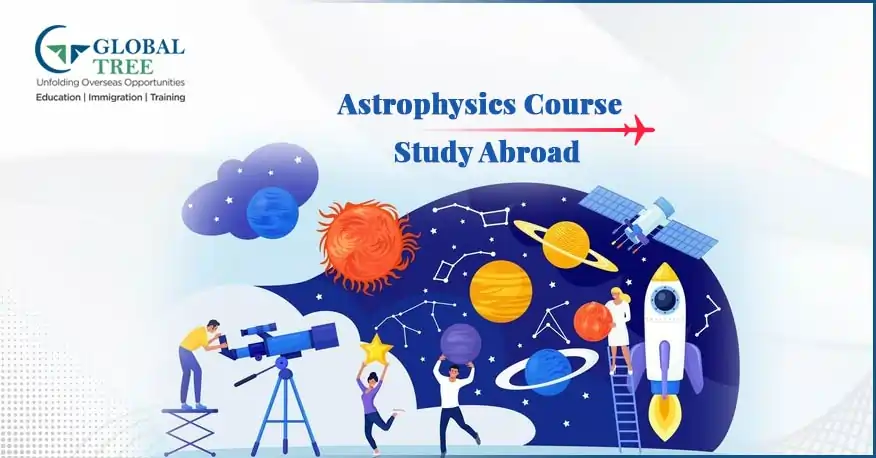Study Astrophysics Course Abroad

Introduction
The primary focus of the astronomical field of astrophysics is on the locations, movements, and unique properties of celestial bodies. This degree entails studying theories and space explorations that have improved our understanding of gravity, black holes, nebulae, stars, galaxies, and the formation and nature of the universe as a whole as well as that of our solar system. This degree can be pursued at the undergraduate, graduate, and doctorate levels.
Who is eligible to study Astrophysics Course Abroad?
Studying astronomy will help you develop a variety of abilities, including teamwork, technical proficiency, the ability to solve complicated problems, critical thinking, logical reasoning, data gathering and analysis, and project management. Choose the Best Astrophysics Course & Colleges to Study Abroad. If they want to learn these abilities and succeed in their careers, students with an inquisitive and determined disposition are recommended to seek this degree.
How much does it cost to study Astrophysics Course Abroad?
To obtain a fundamental understanding of the subject, a bachelor's degree in astrophysics can be undertaken. This degree has a four-year duration and includes both required and elective courses. The typical core classes cover topics including cosmology, beginning quantum mechanics, classical and particle dynamics, physical optics, and planetary atmospheres, in addition to the dynamics of the planets, asteroids, and comets. For overseas students, the average cost of this degree at the University of California, Berkeley is about $29,750 per year.
Students may choose to pursue a master's degree abroad if they want to specialize in a particular area of astrophysics. Students who pursue this degree will be able to create their own coursework, which will result in a thesis. This program has a two-year runtime. The dynamic of stellar and planetary systems, general plasma physics, high energy astrophysics and dark matter, plasma waves and propulsion, scientific computers, and differential equations are some of the typical topics that may be offered. The thesis should be supported by original research and has the potential to redirect the student's career in the direction of teaching. This degree typically costs $13,600 per year for domestic students and $36,300 for international students in the US.
A student may study this topic at the Ph.D. level if they want to work in research and education. A doctorate is focused on independent study, and depending on when your doctoral dissertation is finished, it can take 4-5 years to complete. Cosmic ray astrophysics, solar energetic particles, stellar astronomy, black holes and active galactic nuclei, thunderstorm and lightning physics, planetary surfaces, exoplanets, energetic radiation, and cosmology are some of the research subjects that are typically given to students. In the US, earning this degree often costs between $118,000 and $120,000.
What is the Future Scope of Astrophysics Abroad?
The U.S. Bureau of Labour Statistics predicts that overall employment for astrophysicists will increase by 8% over the next ten years, creating around 21,100 jobs as 1,500 new positions become available annually. Students who study astrophysics will also have the opportunity to select from a wide range of well-paying professions where they can set their own working hours, ensuring a fruitful and long-lasting career.
(Read more: Study Abroad program in Aerospace Engineering Courses)
Trending Career Options in Astrophysics Abroad
Students who want to pursue an education in astronomy have a variety of employment possibilities to consider.
Career as a Technical Analyst
Information system design, implementation, and monitoring are a specialty of systems analysts. Complex computer software linked to storing and managing astronomical data and research can be developed and maintained by astrophysicists. In the US, their yearly average pay is $71,816.
Career as a Study Engineer
A research engineer aids in the completion of research projects and studies. They may perform research in astrophysics to help with the creation of spacecraft, space observation equipment, and astronaut and aeronautical pilot suits. In the US, their yearly average pay is $81,876.
Career as a Seasoned Researcher
Senior scientists working in the field of astrophysics may supervise a group of engineers, research technicians, and scientists as they carry out experiments, finish research projects, create spacecraft, and observer tools, and speak with project managers and directors to validate theories and hypotheses. In the US, their annual average pay is $101,600.
Career as an Engineer in the Aerospace
Spacecraft and space exploration vehicles are designed and constructed by aerospace engineers. To build safe and functional spacecraft, they frequently collaborate with a group of scientists, researchers, project managers, and other engineers. They could create telescopes, satellites, probes, and space shuttles. In the US, their annual average pay is $103,970.
(Read more: Trending Career Options in Mechanical Engineering abroad)
Career as a Chief Technology Officer
A director of technology in the field of astrophysics frequently oversees the creation of computer systems for laboratories as well as those for satellites, telescopes, and spacecraft. The complex computer software required for inter-space communication is designed, installed, maintained, and repaired by a team of other technological specialists under the direction of directors of technology. In the US, their annual average pay is $104,870.









